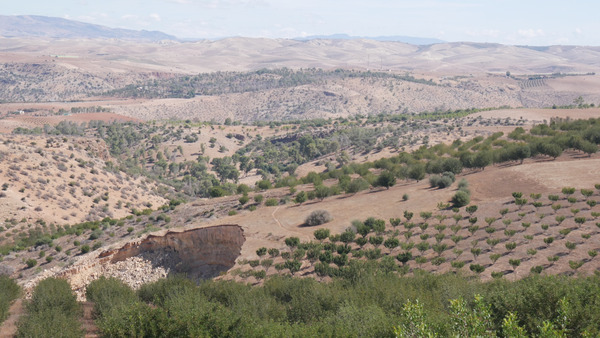Due to years of successive droughts, heat waves, and poorly regulated intensive agricultural practices, many regions in the Mediterranean basin are experiencing deterioration of soil, resulting in a loss of agricultural production potential. Consequently, the economies of rural populations are weakening, and farmland is gradually being abandoned.
Agroforestry Systems (AFS) offer an excellent multidimensional restoration strategy to tackle these challenges and facilitate farm recovery. AFS improve soil quality and enhance the biodiversity and productivity of agroecosystems. Additionally, beyond the biophysical benefits, AFS can improve the livelihoods of smallholders and contribute to job creation by developing value chains for AFS products.
The project's key focus areas
Based on the experiences of several agroforestry lighthouses in Morocco, Tunisia, and Türkiye, TransforMed aims at supporting the large-scale adoption of agroforestry systems in saline, wind eroded and infertile areas.
The project will be focusing on:
- Scaling up successful practices that are ongoing in four lighthouses in Southern Mediterranean regions,
- Using local stress-tolerant and diverse crops (e.g. argan, carobs, and up to 15 other species), whose increased productivity can be essential to promoting socio-economic development in depressed regions,
- Increasing awareness and training local stakeholders to implement AFS,
- Identifying and overcoming the socio-economic and socio-cultural obstacles to the adoption of these systems, and
- Strengthening community self-governance to secure the establishment of the practices beyond the life of the project.
Particular attention will be given to understanding the needs of the Mediterranean contexts studied by the project, identifying the requirements in terms of theoretical knowledge and technical application of agroforestry systems. Finally, efforts will also be devoted to finding relevant and targeted ways to transmit knowledge, through outreach materials (technical sheets, learning documents) or through events aimed at tutoring and exchanging information with farmers, agricultural institutions, universities, and policymakers.
Project launch
The project officially kicked off on the 26th of September with a meeting in Meknes, Morocco. Representatives from the seven international partner institutions gathered to outline the project's roadmap and collaborative efforts. The project is managed and coordinated by the Beta Technological Center, a research institute attached to the University of Vic-Central University of Catalonia, Spain.
Project partners
- BETA, Beta Technological Center, Spain
- ULE, Univeristy of Leon, Spain
- FiBL France, Research Institute of Organic Agriculture, France
- BDIARI, Bahri Dagdas International Agricutural Research Institute, Turkey
- DKM, Nature Conservation Center, Turkyie
- AGENDA, Agriculture, Environment and Development pour l’Avenir, Marocco
- UM6P, University Mohammed VI Polytechnic, Morocco
- SOM, Société L’Ouest Marocain, Morocco
- ICARDA, International Center for Agricultural Reasearch in the Dry Areas, Tunisia
- CTAB, Technical Center of Organic Agriculture, Tunisia
- UEvora, Univeristy of Evora, Portugal
- UK, University of Kassel, Germany
- UB, University of Barcelona, Spain
- DAC, Dryland Agroforestry Center, Portugal
Linked third parties
- FiBL Germany, Research Institute of Organic Agriculture, Germany
- ANDZOA, Agence Nationale pour le Développement des Zones Oasiennes et de l’Arganier, Morocco
- Agriculture Ministry of Tunisia, Forest Department, Tunisia

 tap and then scroll down to the Add to Home Screen command.
tap and then scroll down to the Add to Home Screen command.